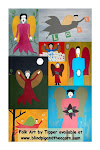By David Browne, Rolling Stone, April 22, 2013 5:15 PM ET
Richie Havens, who brought an earthy soulfulness to the folk scene of the Sixties and was the first act to hit the stage at Woodstock, died of a heart attack on Monday, April 22. He was 72 and was living in Jersey City, New Jersey. Last month, Havens announced he would no longer be touring due to health issues.
From the beginning, when he played Village folk clubs in the mid-Sixties, Havens stood out due to more than just his imposing height (he was six-and-a-half feet tall) and his ethnicity (African-American in a largely white folk scene). He played his acoustic guitar with an open tuning and in a fervent, rhythmic style, and he sang in a sonorous, gravel-road voice that connected folk, blues and gospel.
Like many of his peers, Havens was a songwriter (he co-wrote one of his best-known songs, "Handsome Johnny," with actor Lou Gossett Jr.). But Havens also knew a great contemporary song when he heard it, and made his name covering and rearranging songs by Bob Dylan ("Just Like a Woman," "It's All Over Now, Baby Blue") and the Beatles ("With a Little Help from My Friends," "Eleanor Rigby," "Here Comes the Sun"). "Music is the major form of communication," he told Rolling Stone in 1968. "It's the commonest vibration, the people's news broadcast, especially for kids."
The oldest of nine children, Havens grew up in Brooklyn's poor Bedford-Stuyvesant, the son of a factory worker who played piano; as a teenager, Havens formed a gospel group in high school. Although at one time he said he hoped to be a surgeon, he left home at 17 and landed in Greenwich Village. When he wasn't painting portraits of tourists to make money, Havens was playing the folk clubs there. Among those who noticed him was Dylan: "One singer I crossed paths with a lot, Richie Havens, always had a nice-looking girl with him who passed the hat and I noticed that he always did well," Dylan wrote in his memoir Chronicles: Volume One.
After recording two albums for a small label, Havens hooked up with Dylan's manager, Albert Grossman. With that, Havens' visibility jumped up a new notches. In 1966, Havens was signed to Verve/Folkways, who released his classic Mixed Bag that year. Havens already had a growing audience thanks to albums like 1968's ambitious blues-folk-psychedelic double LP Richard P. Havens, 1983, when he signed up for Woodstock. Recalling his trip into the grounds by helicopter, he later said, "It was awesome, like double Times Square on New Year's Eve in perfect daylight with no walls or buildings to hold people in place."
Havens wasn't supposed to be the first act to open the festival; that slot originally was intended for the band Sweetwater, but that band wound up being stuck in traffic. Backstage, co-organizer Michael Lang approached Havens and practically begged him to go on instead. "It had to be Richie – I knew he could handle it," Lang later wrote.
After performing a half-dozen songs, Havens ran out of material – until, he later said, he remembered "that word I kept hearing while I looked over the crowd in my first moments onstage. The word was: freedom." Havens began chanting that word over and over, backed by his second guitarist and conga player, and eventually segued into the gospel song "Sometimes I Feel Like a Motherless Child," which he had heard in church as a child. The combined, surging medley wasn't just a crowd-pleaser; it later became a highlight of the Woodstock movie, which also immortalized Havens' orange dashiki. (What many didn't know at the time was that Havens wore dentures, which also gave his singing voice a unique tone.) "My fondest memory was realizing that I was seeing something I never thought I'd ever see in my lifetime – an assemblage of such numbers of people who had the same spirit and consciousness," he later recalled of Woodstock to Rolling Stone.
In the years after Woodstock, Havens maintained his momentum, finally scoring a top 20 hit in 1971 with a version of George Harrison's "Here Comes the Sun." (That cover resulted in his best-selling album, 1971's Alarm Clock.) He continued recording for a series of other labels, including A&M, and even branched out into acting, playing Othello in the rock musical Catch My Soul in 1974 and appearing in the 1977 Richard Pryor film Greased Lightning. Though his record sales dimmed, his passion for politics and music didn't. In 1978, he scored a Number One hit in Israel with "Shalom, Salaam Aleichum," written in response to watching Anwar Sadat visit Jerusalem.
Havens continued to record and tour, and he also survived by singing jingles for Amtrak (the famous "Something about a train . . . " line) and McDonald's (which used his "Here Comes the Sun"). In recent years, Havens was rediscovered by a new generation. His collaboration with Groove Armada, "Hands of Time," appeared on the soundtrack of the 2004 Tom Cruise film Collateral. He also published a memoir, They Can't Hide Us Anymore, in 2000 and released his final album, Nobody Left to Crown, in 2008. A public memorial is in the works.





















































3 comments:
One of the greats! K.
I truly loved this simple man with a booming voice
Hi, K.! I was only 18 at the time of Woodstick. We lived just hours away. But there was no way they were going to let me go, even if it would have been with my brothers! But I'd already adored Dylan, Baez, CSN&Y, and so many who'd already enjoyed Havens, who had been influenced by the aforementioned. A wonderful soul! :))
Hi, Sandy! Wholeheartedly agree! :))
Post a Comment